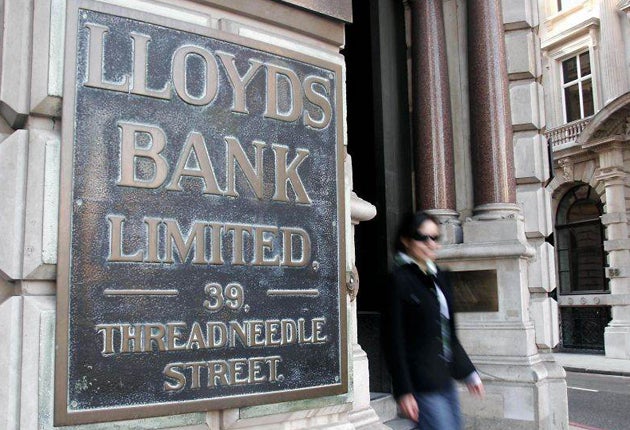David Prosser: The banks are recovering but at borrowers' expense

Outlook Remember the good old days of playing the mortgage lenders for fools? There was a time, in the pre-credit crunch world, when promiscuous borrowers hopped from lender to lender, exploiting their short-term, loss-leading fixed ordiscounted rate offers, and then moved on to the next conquest before the more expensivestandard variable rate (SVR) kicked in.
Those days are gone. One piece of good news trumpeted by Lloyds Banking Group yesterday was an improvement in its margins. The gain is explained by an ever-increasing number of mortgage customers who are coming off the cheap deals that lured them to the lender a few years back and who are being moved on to its higher SVR. There they are stuck because no lender – including Lloyds itself – offers a deal that undercuts that default rate. Lloyds' SVR is actually just 3.5 per cent, a price of which mortgage borrowers could only dream in all but the most recent past. Still, at seven times the Bank of England's 0.5 per cent base rate, you can see why Lloyds – and the same is true of other lenders – is enjoying an uplift in its margins.
Lloyds' gain is customers' loss, of course, and borrowers would be within their rights to ask whether they are being exploited. The other side of the argument is that it was the years of easy credit, when lenders chased borrowers at any price, which led to the crisis in the first place.
It's the same argument in the SME sector, where businessescontinue to complain about lack of access to credit despite the banks' claims that they are lending. Lloyds' commitment is that it will not turn down a borrowing request from any creditworthy business, while its rivals have made similar pledges. Explaining that contradiction may just be a matter of pointing out that creditworthiness is a subjective matter and that an offer of credit may still be no use if it is not affordable. Wherever the exact truth of the issue lies, the wider point is that for SMEs, like mortgage borrowers, there is little prospect of a return to the pre-crisis days of much easier credit.
We can argue about the rights and wrongs of this changed world. Certainly it seems tough thatborrowers who would once have been welcomed with open arms now find themselves spurned. But for Lloyds, the context is the need to shrink the balance sheet and to repay the support extended to it by central banks during the dark days. These will remain the priority for the foreseeable future.
Subscribe to Independent Premium to bookmark this article
Want to bookmark your favourite articles and stories to read or reference later? Start your Independent Premium subscription today.

Join our commenting forum
Join thought-provoking conversations, follow other Independent readers and see their replies